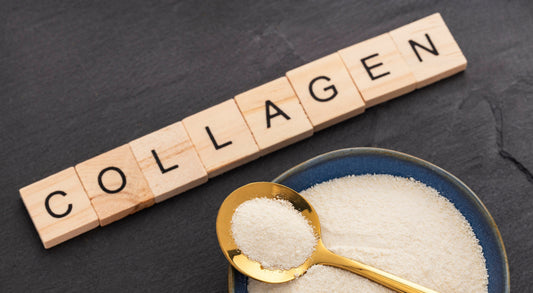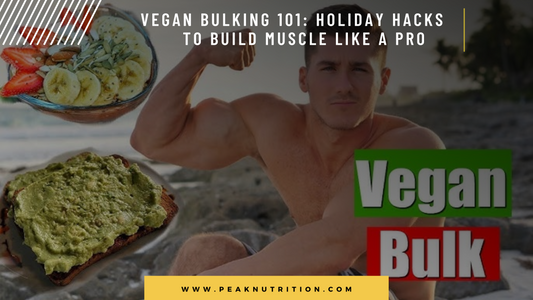What You Need to Know About Artificial Sweeteners
Share
Artificial sweeteners have become a hot topic in the world of nutrition and fitness. As people become more health-conscious, the desire to reduce sugar intake without sacrificing sweetness has led to a boom in the artificial sweetener market. But with so many options available, it can be challenging to make an informed decision. This guide will provide you with everything you need to know about four of the most popular artificial sweeteners: aspartame, sucralose, stevia, and monk fruit. We'll explore their differences and how to choose the right one for your fitness journey.
Introduction to Artificial Sweeteners
Artificial sweeteners, also known as non-nutritive sweeteners, are substances used to sweeten foods and beverages without adding significant calories. They are often many times sweeter than sugar, so only a small amount is needed to achieve the desired sweetness. These sweeteners have become popular among those looking to reduce their sugar intake, manage weight, or control blood glucose levels. Artificial sweeteners are found in a variety of products, from diet sodas and sugar-free gum to baked goods and even toothpaste. While they offer a way to enjoy sweetness without the calories, there is much debate about their safety and long-term effects.
Aspartame
Aspartame is one of the most widely used artificial sweeteners and is approximately 200 times sweeter than sugar. It is commonly found in diet sodas, sugar-free gum, and various low-calorie foods. Pros:
- Low in calories
- Does not affect blood sugar levels
Cons:
- Contains phenylalanine, which can be harmful to individuals with phenylketonuria (PKU)
- Some people report headaches or other side effects
Aspartame Overview
Aspartame is a synthetic sweetener composed of two amino acids, aspartic acid and phenylalanine. It was discovered in 1965 and has been extensively studied for safety. The FDA and other regulatory agencies worldwide have deemed aspartame safe for consumption within established limits.
Health Implications
Aspartame does not raise blood sugar levels, making it suitable for people with diabetes. However, individuals with PKU must avoid it due to its phenylalanine content. While some people report side effects like headaches, extensive research has not conclusively linked aspartame to severe health issues.
Sucralose

Sucralose, known by the brand name Splenda, is about 600 times sweeter than sugar. It is heat-stable, making it suitable for cooking and baking. Pros:
- Heat-stable, suitable for cooking
- Does not affect blood sugar levels
Cons:
- Some studies suggest it may affect gut bacteria
- Can leave a chemical aftertaste
Sucralose Overview
Sucralose is a chlorinated derivative of sucrose (table sugar) and was discovered in 1976. Unlike some other artificial sweeteners, sucralose is not metabolized by the body, meaning it passes through the digestive system unchanged.
Health Implications
Sucralose does not raise blood sugar levels, making it a good option for those with diabetes. However, some studies suggest that sucralose may alter gut bacteria, which could have implications for gut health. More research is needed to fully understand these effects.
Stevia

Stevia is a natural sweetener derived from the leaves of the Stevia plant. It is about 200-300 times sweeter than sugar and is often marketed as a healthier alternative to artificial sweeteners. Pros:
- Natural origin
- Zero calories
- May have additional health benefits
Cons:
- Can have a licorice-like aftertaste
- Some people may experience digestive issues
Stevia Overview
Stevia has been used as a sweetener for centuries in South America. The sweet compounds in stevia, known as steviol glycosides, are extracted and purified for use in foods and beverages. The FDA has granted stevia a Generally Recognized as Safe (GRAS) status.
Health Implications
Stevia does not raise blood sugar levels and has been suggested to have potential health benefits, including blood pressure and blood sugar regulation. However, some people may find its aftertaste off-putting or experience mild digestive issues.
Monk Fruit

Monk fruit sweetener is derived from the monk fruit and is about 150-200 times sweeter than sugar. It is another natural alternative to artificial sweeteners. Pros:
- Natural origin
- Zero calories
- Generally well-tolerated
Cons:
- More expensive than other sweeteners
- Availability may be limited
Monk Fruit Overview
Monk fruit, also known as Luo Han Guo, has been used in traditional Chinese medicine for centuries. The sweet compounds, called mogrosides, are extracted to create a concentrated sweetener. Monk fruit sweetener has been recognized as safe by the FDA.
Health Implications
Monk fruit sweetener does not impact blood sugar levels and is generally well-tolerated with few reported side effects. Its natural origin makes it an appealing choice for those looking to avoid synthetic sweeteners.
How Artificial Sweeteners Work
Artificial sweeteners mimic the taste of sugar without the calories. They achieve this by binding to the sweet taste receptors on our tongue, triggering the same sweet sensation as sugar. Since they are much sweeter than sugar, only a small amount is needed to achieve the desired sweetness. Most artificial sweeteners pass through the digestive system without being broken down or absorbed, which is why they do not contribute calories or affect blood sugar levels.
The Benefits of Artificial Sweeteners
Artificial sweeteners offer several benefits, particularly for those looking to reduce their sugar intake or manage weight:
Weight Management
By replacing sugar with artificial sweeteners, you can reduce your overall calorie intake, which can help with weight management. For example, swapping a regular soda for a diet soda can save you about 150 calories per can.
Blood Sugar Control
Artificial sweeteners do not raise blood sugar levels, making them a suitable option for people with diabetes or those trying to manage their blood glucose levels.
Dental Health
Unlike sugar, artificial sweeteners do not contribute to tooth decay. Some, like stevia, even have protective effects on dental health.
Versatility
Many artificial sweeteners are heat-stable, making them suitable for cooking and baking. This allows for a wide range of low-calorie, sugar-free recipes.
Potential Risks and Controversies
While artificial sweeteners offer many benefits, they are not without controversy. Here are some of the potential risks and concerns:
Health Concerns
Some studies have linked artificial sweeteners to various health issues, including cancer, although the evidence is not conclusive. The FDA and other regulatory agencies have deemed artificial sweeteners safe for consumption within established limits.
Digestive Issues
Stevia and monk fruit are generally well-tolerated, but some people may experience digestive issues, especially with excessive consumption.
Impact on Gut Bacteria
There is some evidence to suggest that sucralose may alter gut bacteria, potentially affecting metabolism and overall health. However, more research is needed to fully understand these effects.
Taste and Aftertaste
Some people find that artificial sweeteners have a chemical or bitter aftertaste, which can affect the taste of foods and beverages.
Artificial Sweeteners vs. Natural Sweeteners
In addition to artificial sweeteners, there are several natural sweeteners available, such as honey, maple syrup, and agave nectar. While these sweeteners are often perceived as healthier, they still contain calories and can affect blood sugar levels.
Comparing Artificial and Natural Sweeteners
Calories:
- Artificial sweeteners: Zero or very low calories
- Natural sweeteners: Contain calories
Blood Sugar Impact:
- Artificial sweeteners: Do not raise blood sugar levels
- Natural sweeteners: Can raise blood sugar levels
Health Benefits:
- Artificial sweeteners: Do not contribute to tooth decay
- Natural sweeteners: May contain vitamins and minerals, but still contribute to tooth decay
Taste:
- Artificial sweeteners: Can have a chemical or bitter aftertaste
- Natural sweeteners: Often have a more pleasant taste
Choosing the Right Artificial Sweetener for You
Choosing the right artificial sweetener depends on your personal preferences, health goals, and any specific dietary needs. Here are some factors to consider:
Taste
Different artificial sweeteners have different taste profiles. Some may have a more pleasant taste or less aftertaste than others. It may take some experimentation to find the one that suits your palate.
Intended Use
Consider how you plan to use the sweetener. If you need a sweetener for baking, choose one that is heat-stable, like sucralose or stevia. For sweetening beverages, any artificial sweetener should work.
Health Concerns
If you have specific health concerns or conditions, such as PKU, choose a sweetener that is safe for you. Consult with a healthcare professional if you are unsure.
Availability and Cost
Some artificial sweeteners may be more readily available or cost-effective than others. Consider what is available at your local store or online.
Frequently Asked Questions
Are artificial sweeteners safe? Yes, artificial sweeteners are considered safe for consumption within the established limits set by regulatory agencies like the FDA. However, it is always a good idea to consume them in moderation. Can artificial sweeteners help with weight loss? Artificial sweeteners can help reduce overall calorie intake, which can aid in weight management. However, they are not a magic solution and should be used as part of a balanced diet and healthy lifestyle. Do artificial sweeteners cause cancer? There is no conclusive evidence that artificial sweeteners cause cancer in humans. Some studies have raised concerns, but regulatory agencies have reviewed the evidence and deemed them safe for consumption. Can artificial sweeteners affect blood sugar levels? Most artificial sweeteners do not affect blood sugar levels, making them suitable for people with diabetes or those managing blood glucose levels. Do artificial sweeteners cause digestive issues? Stevia and monk fruit are generally well-tolerated, but some people may experience digestive issues with excessive consumption. What is the best protein, that doesn't use Sucralose? Check out this review!
Conclusion
Artificial sweeteners offer a way to enjoy sweetness without the added calories and sugar. While there are many benefits, it's essential to choose the right one based on your taste preferences, health goals, and dietary needs. By understanding the differences between aspartame, sucralose, stevia, and monk fruit, and their potential risks and benefits, you can make an informed decision that supports your fitness journey. At Peak Nutrition, we're committed to providing you with the best information and products to help you achieve your health and fitness goals. Whether you're looking for sugar-free supplements or advice on nutrition, we're here to support you every step of the way.




